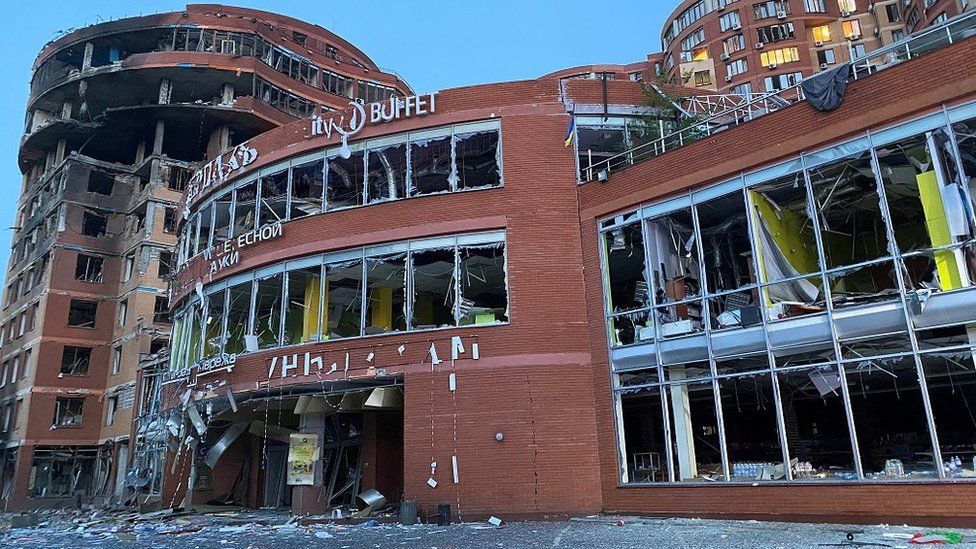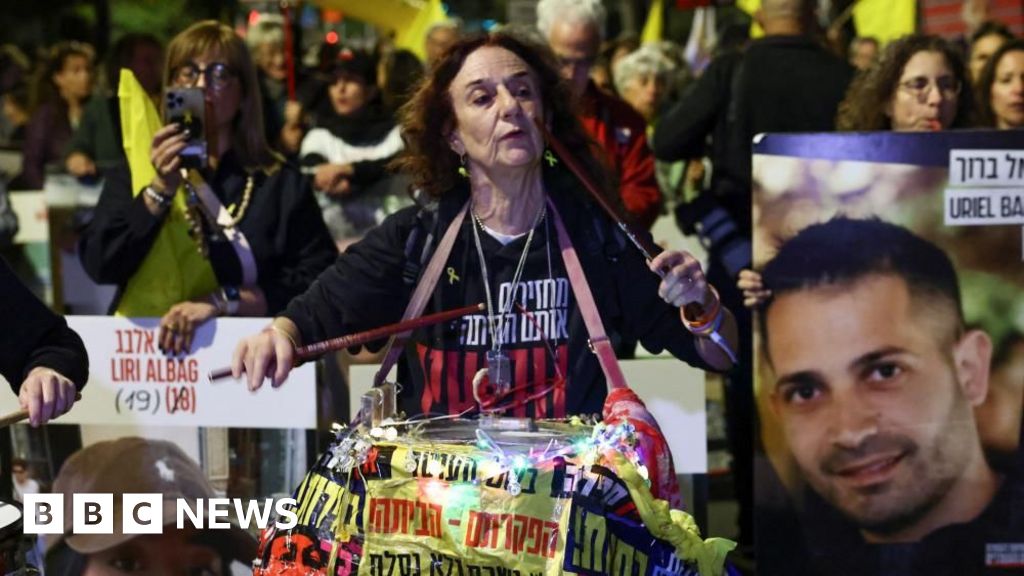ARTICLE AD BOX
 Image source, UKRAINIAN ARMED FORCES
Image source, UKRAINIAN ARMED FORCES
At least three people have been killed in a relatively rare Russian strike on the Black Sea port city of Odesa, Ukrainian officials have said.
Another 13 people were injured in the early morning attacks, which targeted a warehouse and damaged shops.
The south-western city is vital to Ukraine's grain exports through the Black Sea and has come under infrequent missile fire during the war.
The strikes come as Ukraine's counter-offensive continues to gain ground.
Kyiv's much-anticipated advance has been long in the making, and Ukrainian officials have accused Russia of stepping up missile strikes in recent weeks to deflect attention from the offensive.
Military commanders said Russia fired 10 missiles and 10 drones overnight, most of which were shot down by air defences.
They added that three of four KH-22 missiles launched from a Russian warship in the Black Sea were shot down, with the final one managing to hit Odesa.
Oleg Kiper, the head of the region's military administration, said the three dead were workers in the warehouse, which was being used as a food storage centre.
"There may be people under the rubble," he added. More civilians were injured after the blast and "air combat" damaged shops, restaurants - including a McDonald's - and residential areas, Mr Kiper wrote on Telegram.
As well as being one of Ukraine's biggest ports, Odesa is also known as the pearl of the Black Sea an isd home to a number of historical buildings. In January, the United Nations cultural agency Unesco designated the city centre as an endangered World Heritage site in light of Russian attacks.
And the city has long been a prize target for Russian forces.
Elsewhere, strikes on the eastern cities of Kramatorsk and Kostiantynivka killed a further three people and destroyed dozens of residential houses, Ukrainian authorities said.
And six people - including four forestry workers - were killed after Russia shelled a a van in north-eastern Ukraine on Tuesday. Ukrainian prosecutors said the attack occurred near the village of Seredyna-Buda, close to the Russian border.
Russia has stepped up its bombing campaign in recent weeks, despite President Vladimir Putin admitting that his forces are suffering from a shortage of missiles and drones.
The attacks - which have killed dozens of civilians this week - come as Ukraine's counter-offensive in the south and east gains momentum.
The Ukrainians say their troops have recaptured seven settlements and at least 90 sq km (35 sq miles) since starting their counter-offensive.
Deputy Defence Minister Hanna Maliar wrote on Telegram that Ukrainian forces had also advanced around the city of Bakhmut, long the centre of a grinding and bloody street-by-street battle with Russian forces.
Ms Maliar said soldiers advanced by some 200m to 500m towards Bakhmut, and 300m to 500m in the southern Zaporizhzhia province. The BBC cannot independently verify these claims.
But she conceded that the counter-offensive had already led to some "extremely fierce battles", as Ukrainian forces try to break through Russian defensive lines.
Image source, Reuters
Image caption,Ukraininan troops have recaptured several settlements in the east of the country
Fresh reports have also emerged of casualties among senior Russian commanders.
In Kherson, the Russian-installed governor, Vladimir Saldo, wrote on Telegram that Maj Gen Sergei Goryachev was killed in action by Ukrainian forces.
And pro-Russian military bloggers have also suggested that one of the top commanders of Russia's Chechen paramilitary forces fighting in Ukraine has been injured.
Russia has lost a number of senior generals since the war began, a relatively unusual feature of modern warfare, where top commanders normally remain far behind their own lines.
Some analysts have suggested Moscow's commanders have been forced further forward because of junior officers' reluctance to take serious operational decisions.
But the story of the advance is not as clear-cut as the triumphant claims of liberation that came from Kyiv earlier this week.
On Tuesday, the BBC was granted access to some of the first settlements in eastern Donetsk, where the Ukrainian flag is now flying. Many are deserted, and in some areas Russian forces are pushing back.
Meanwhile, the director of the UN's nuclear watchdog has postponed a planned trip the the Zaporizhzhia nuclear plant.
Senior Ukrainian officials said Rafael Grossi had agreed to delay his trip until it was safer to travel. The International Atomic Energy Agency (IAEA) chief said on Tuesday that he was "very concerned" that the plant could be caught in the crossfire of Ukraine's counter-offensive.
His officials have also stressed their need to access a site near the plant to check water levels, after the nearby reservoir supplying cooling pools for the plant was hit by the destruction of the Kakhovka dam.

 1 year ago
39
1 year ago
39








 English (US)
English (US)